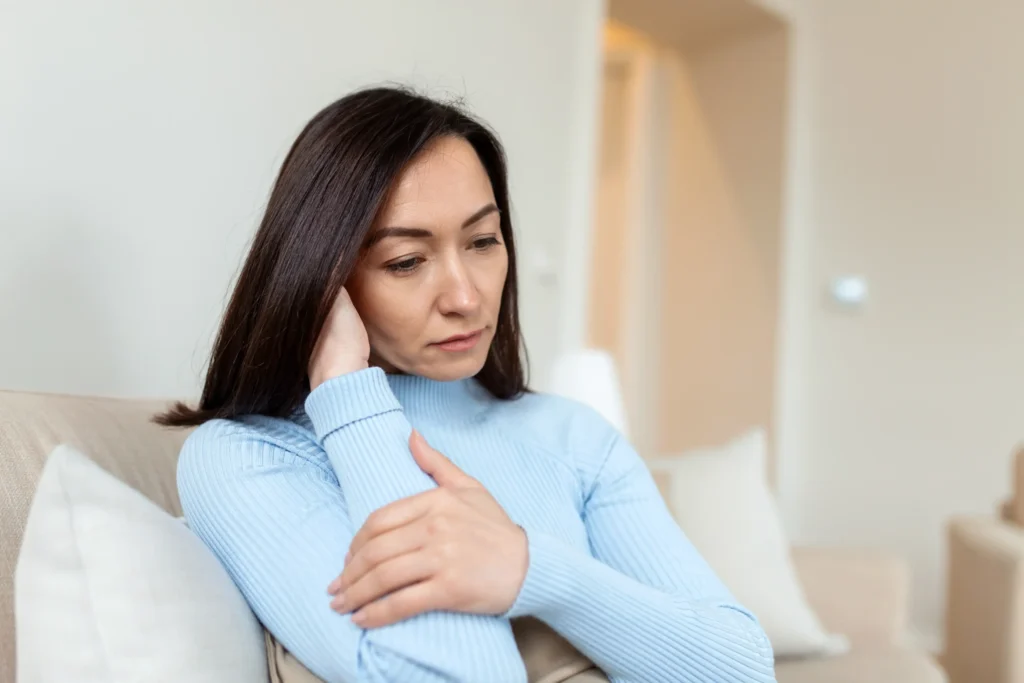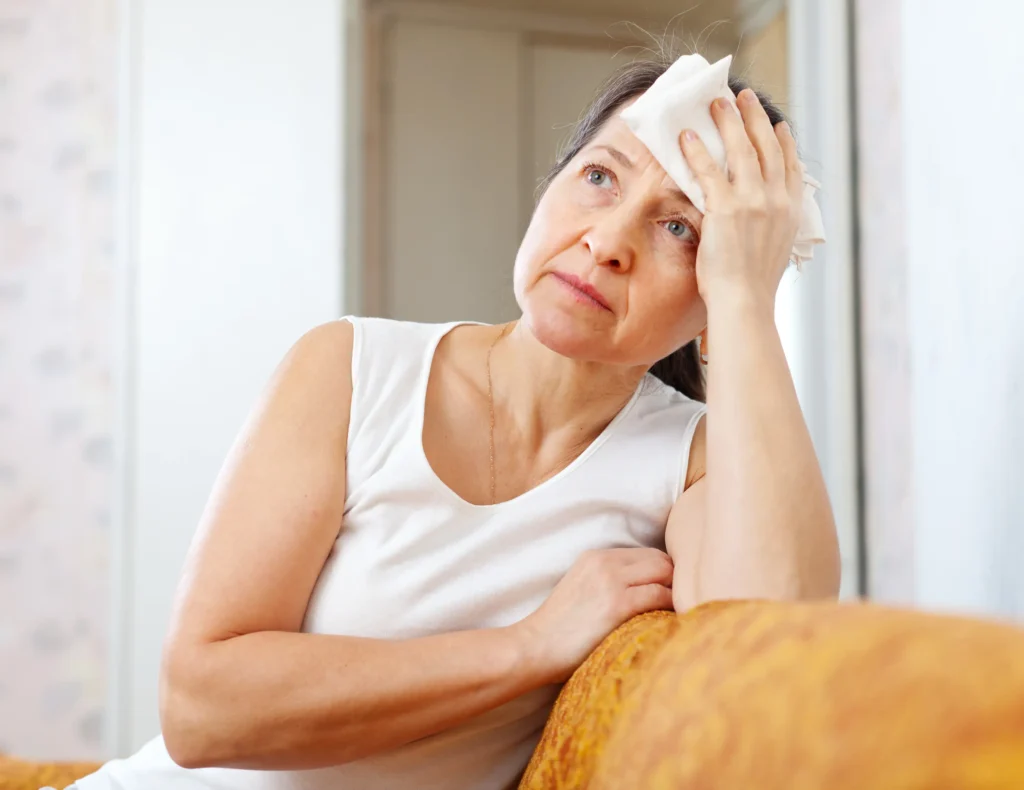MENOPAUSE
Menopause
Menopause or Climacteric Stage
Menopause refers to the physical and emotional changes experienced by women due to a decline in estrogen, the primary female hormone. The average age of onset is around 50 years, and it is typically diagnosed after a woman has gone 12 consecutive months without menstruation. Menopause may also occur prematurely in women who undergo surgical removal of both ovaries, resulting in the natural cessation of menstruation.
Take a moment to observe—are you experiencing any of these symptoms?
1. Hot flashes, excessive sweating, mood swings
These symptoms often begin in areas such as the face, neck, head, or chest. Some may also experience heart palpitations. Episodes can last from a few seconds to several minutes, especially at night. This is one of the most specific and common signs of menopause, particularly during the first 1–2 years, and usually resolves on its own over time.
2. Dry and sagging skin
A decline in estrogen levels leads to a loss of skin collagen—up to 30% within the first 10 years. This causes the skin to become dry and saggy. Additionally, reduced skin vitality can decrease the skin’s ability to produce vitamin D.
3. Emotional and mental health changes
Symptoms may include anxiety, irritability, difficulty concentrating, and depression. While these symptoms are not directly caused by a drop in estrogen, they are often linked to emotional responses to the physical changes and concerns about aging or loss of youthful appearance.
4. Reproductive and urinary tract issues
A reduction in estrogen leads to thinning tissues and reduced blood flow in the genital area. This can cause narrowing of the vaginal opening, thinning of the vaginal wall, and symptoms such as itching, irritation, and burning sensations. Sexual desire may decrease. Weakening of pelvic muscles can result in uterine or bladder prolapse. Changes in the bladder neck and urethral area increase the risk of urinary tract infections, frequent urination, urgency, difficulty urinating, or urinary incontinence.

What Health Conditions May Arise?
1. Osteoporosis
This condition is common among the elderly, especially postmenopausal women. It significantly increases the risk of bone fractures—even from minor accidents—particularly in the spine and hips. During the first five years after menopause, women can lose up to 20% of their total bone mass due to a rapid decline in estrogen levels.
2. Cardiovascular Disease
Estrogen deficiency is a major factor that raises the risk of heart and vascular diseases. It contributes to elevated blood lipids—especially by increasing “bad” cholesterol (LDL) and decreasing “good” cholesterol (HDL). This imbalance promotes plaque buildup in blood vessels, leading to blockages in the heart and brain arteries.
3. Other Risk Factors
Menopause is also associated with an increased risk of developing other conditions such as obesity, high blood pressure, and high cholesterol levels.
Preparing for Menopause: Don’t Wait for the Symptoms
“Test early. Know early. Prevent early.”
1. Schedule regular health check-ups
Visit your doctor for routine screenings, including lipid profile, blood sugar, blood pressure, liver and kidney function tests, urinalysis, pelvic exams, and cervical cancer screening.
แพคเกจตรวจฮอร์โมนหญิง

2. Support hormone balance
Take hormone-supporting vitamins and use hormone-balancing creams. Supplement with calcium and vitamin D to maintain bone health.
Suggested options: Growth Hormone Booster, Hormone Cream

3. Eat a balanced, nutritious diet
Focus on calcium-rich, low-fat, high-fiber foods. Fiber helps reduce the absorption of fat and sugar in the body.
4. Prioritize rest and stress relief
Ensure adequate sleep and engage in relaxing activities. Consider IV vitamin treatments to help your body unwind and rejuvenate.
Suggested therapies: Ozone Therapy, NAD+, Resveratrol IV, Immune Support, Bio Peptide IV
5. Exercise regularly
Engage in physical activity at least 3 times per week to build muscle, reduce bad cholesterol, and lower the risk of cardiovascular disease.
Vascular Detox IV can help clear plaque from blood vessel walls and balance fat metabolism, reducing the risk of arterial blockages and heart disease.

ปัญหาฮอร์โมนพร่องหรือออร์โมนไม่สมดุล มีได้ในทุกเพศทุกวัย โดยจะมีอาการที่แตกต่างกันออกไป ได้แก่ อ่อนเพลียง่าย ไม่สดชื่น ขี้ลืม การเผาผลาญลดลง อ้วนง่าย อารมณ์ทางเพศต่ำลง อวัยวะเพศชายไม่แข็งตัว อ้วนลงพุง นอนไม่หลับ ผิวแห้ง ซึมเศร้า เป็นต้น
ท่านที่มีอาการเหล่านี้ สามารถตรวจวิเคราะห์ระดับฮอร์โมน และปรับฮอร์โมนได้ตรงจุด ทำให้กลับมามีพลัง สดชื่น แข็งแรง กระปรี้กระเปร่า รู้สึกเป็นหนุ่มสาวอีกครั้ง รวมไปถึงในกลุ่มผู้ที่ออกกำลังกายและนักกีฬา สามารถวิเคราะห์ ดูแลและให้คำปรึกษาเรื่องการสร้างกล้ามเนื้อได้อีกด้วย
ในสตรีวัยทอง สามารถบำบัดได้ด้วยฮอร์โมน รวมไปถึงการใช้สารสกัดจากรกและการรับประทานวิตาเสริมเฉพาะบุคคล
วัยทอง หรือวัยหมดประจำเดือนเกิดมาจากฮอร์โมนเพศหญิงลดต่ำลงเมื่ออายุมากขึ้น ทำให้ร่างกายและอารมณ์เปลี่ยนแปลง เช่น มีอาการร้อนวูบวาบ อารมณ์แปรปรวน และช่องคลอดแห้ง คัน อักเสบ รวมถึงมีความเสี่ยงต่อโรคกระดูกพรุน โรคไขมันในเลือด โรคหลอดเลือดหัวใจ และโรคสมองเสื่อมอัลไซเมอร์
การบำบัดด้วยฮอร์โมนจะใช้ฮอร์โมนที่เลียนแบบธรรมชาติ (Bio-identical Hormone) ซึ่งเป็นฮอร์โมนที่มีการพิสูจน์แล้วว่ามีประสิทธิภาพสูง ปลอดภัย มีผลข้างเคียงและเป็นอันตรายต่อร่างกายน้อยที่สุด ช่วยให้ผู้ที่มีภาวะพร่องฮอร์โมนกลับมามีภาวะสมดุลอีกครั้ง
โดยต้องอยู่ภายใต้การดูแลของแพทย์ และมีการติดตามอย่างใกล้ชิด โดยแพทย์จะมีการตรวจหาระดับฮอร์โมนอย่างละเอียด และพิจารณาเลือกใช้ฮอร์โมนให้เหมาะสมกับความต้องการของแต่ละบุคคล



